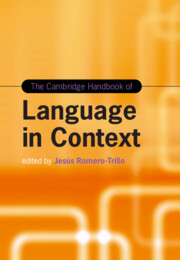Book contents
- The Cambridge Handbook of Language in Context
- Cambridge Handbooks in Language and Linguistics
- The Cambridge Handbook of Language in Context
- Copyright page
- Contents
- Figures
- Tables
- Contributors
- Acknowledgments
- Language in Context Studies
- Part I Language in Context: A Sociohistorical Perspective
- Part II Philosophical, Semantic, and Grammatical Approaches to Context
- Part III Pragmatic Approaches to Context
- 8 The Role of Context in Gricean and Neo-Gricean Pragmatics
- 9 Sociopragmatics and Context
- 10 Natural Semantic Metalanguage and Context
- 11 Relevance Theory and Context
- 12 The Interplay of Linguistic, Conceptual, and Encyclopedic Knowledge in Meaning Construction and Comprehension
- 13 Corpus Pragmatics
- 14 Prosodic Pragmatics in Context
- Part IV Applications of Context Studies
- Part V Advances in Multimodal and Technological Context-Based Research
- Index
- References
8 - The Role of Context in Gricean and Neo-Gricean Pragmatics
from Part III - Pragmatic Approaches to Context
Published online by Cambridge University Press: 30 November 2023
- The Cambridge Handbook of Language in Context
- Cambridge Handbooks in Language and Linguistics
- The Cambridge Handbook of Language in Context
- Copyright page
- Contents
- Figures
- Tables
- Contributors
- Acknowledgments
- Language in Context Studies
- Part I Language in Context: A Sociohistorical Perspective
- Part II Philosophical, Semantic, and Grammatical Approaches to Context
- Part III Pragmatic Approaches to Context
- 8 The Role of Context in Gricean and Neo-Gricean Pragmatics
- 9 Sociopragmatics and Context
- 10 Natural Semantic Metalanguage and Context
- 11 Relevance Theory and Context
- 12 The Interplay of Linguistic, Conceptual, and Encyclopedic Knowledge in Meaning Construction and Comprehension
- 13 Corpus Pragmatics
- 14 Prosodic Pragmatics in Context
- Part IV Applications of Context Studies
- Part V Advances in Multimodal and Technological Context-Based Research
- Index
- References
Summary
This chapter explores the role of context in the computation of implicit pragmatic meanings (implicatures). In the classic view of Gricean and neo-Gricean pragmatics, conversational implicatures are triggered by the Cooperative Principle and the maxims of conversation, and are defined as non-contextual, with the exception of particularized conversational implicatures (PCIs). On the other hand, it is assumed that generalized conversational implicatures (GCIs) and conventional implicatures (CIs) are not contextual, although GCIs can be defeated by the context or denied by the speaker. This non-contextual approach to pragmatics (the Gricean turn) has given rise to a default approach to implicatures. The second purpose of this chapter is to tackle the contextual dimension of neo-Gricean pragmatics, which has been developed by exponents of neo-Gricean pragmatics. Their approaches to pragmatics, limited to GCIs as scalar implicatures, are based either on pragmatic principles, the Q-Principle and R- or I-principle (Horn, Levinson), or on the reformulation of conversational maxims and reasoning (Gazdar, Chierchia, Fox). It is argued that the focus on GCIs, although it should minimize the role of context in the generation of implicatures, demonstrates on the contrary the pervasive function of context, which is not limited to implicature cancellation.
Keywords
- Type
- Chapter
- Information
- The Cambridge Handbook of Language in Context , pp. 183 - 204Publisher: Cambridge University PressPrint publication year: 2023
References
- 1
- Cited by



